The prevalence of thyroid disorders is widespread, affecting millions of individuals around the globe and profoundly impacting their quality of life. If you are seeking a comprehensive resource that delves into the intricacies of thyroid conditions, you have arrived at the right destination.
We aim to provide you with a wealth of knowledge encompassing various facets of thyroid disorders in a very simple way. We cover a wide array of topics, beginning with the anatomy and function of the thyroid gland itself. Understanding the inner workings of this remarkable organ sets the foundation for comprehending the complexities of thyroid disorders.
Within our comprehensive guide, we delve into the most common thyroid disorders encountered: hyperthyroidism, hypothyroidism, and thyroid nodules. We shed light on the causes, symptoms, and diagnostic tests associated with each condition, empowering you with the information needed for early recognition and effective management.
In addition to conventional treatment options, we explore natural solutions that can serve as valuable adjuncts to conventional care. We recognize the significance of dietary modifications and provide insights into avoiding certain canned fruits and vegetables while encouraging variety in breakfast choices. Furthermore, we delve into the realm of exercise and its role in supporting thyroid health and increasing energy levels, offering practical advice to optimize your fitness routine.
Also, I am excited to introduce a tried and tested method 21-Day Natural Solutions System For Women, specifically designed to address thyroid-related concerns. This program offers a holistic approach to improving well-being, encompassing nutrition, exercise, and lifestyle factors. By embracing this system, you can embark on a transformative journey towards enhanced vitality and balance.
I invite you to explore our articles, which are thoughtfully curated in simple language to provide you with a comprehensive understanding of thyroid-related issues. By empowering yourself with knowledge and discovering effective strategies, you can take charge of your thyroid health and embark on a path of improved well-being.
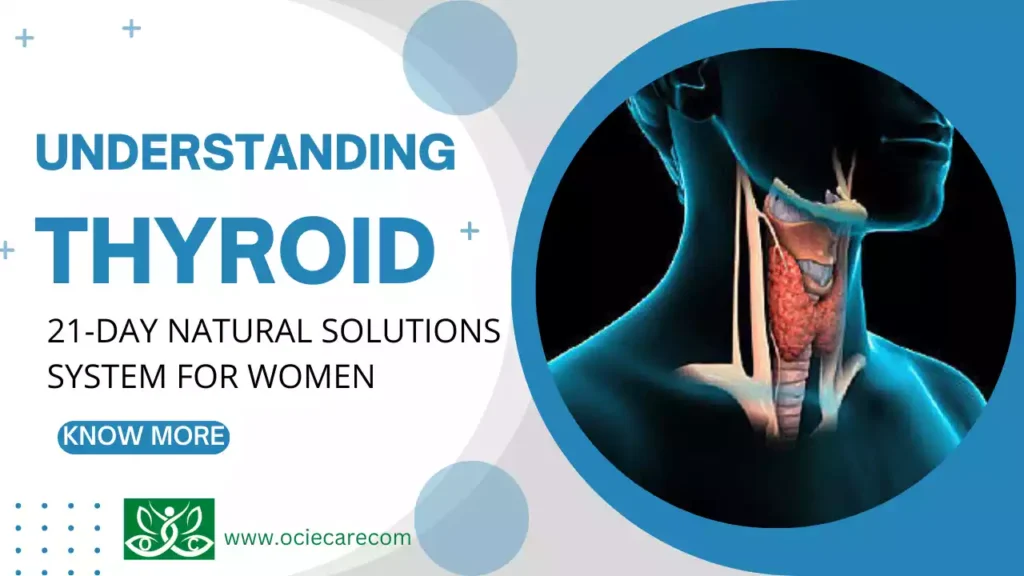
Understanding Thyroid: A 21-Day Natural Solutions System For Women
Introduction: The Intricacies of the Thyroid
The thyroid gland, a remarkable organ nestled in the front of the neck, holds a complex and crucial role in our bodies. This small butterfly-shaped gland may seem inconspicuous, but its impact on various bodily functions is profound. From metabolism and growth to temperature regulation and energy production, the thyroid gland orchestrates an intricate symphony within us.
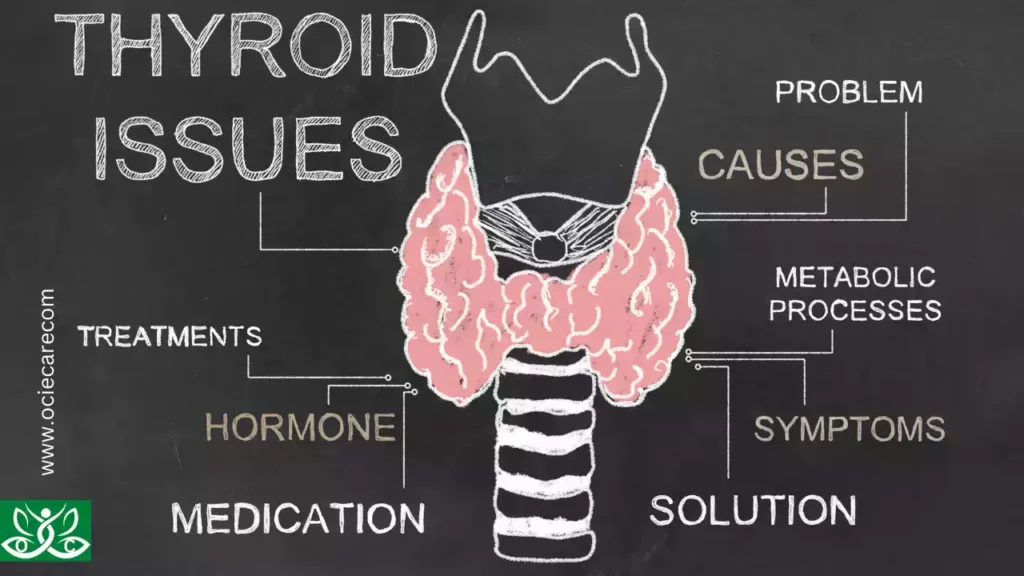
Managing thyroid disorders involves a multifaceted approach. Medications, such as synthetic thyroid hormones or anti-thyroid drugs, can help restore balance. Lifestyle modifications, including a balanced diet, stress management, and regular exercise, support overall thyroid health. In some cases, surgical intervention or radioactive iodine therapy may be necessary.
Understanding the intricacies of the thyroid gland empowers us to recognize the importance of thyroid health and seek appropriate care when needed. By working closely with healthcare professionals, we can navigate the complexities of thyroid disorders, ensure proper treatment, and maintain the delicate harmony orchestrated by this remarkable gland.
What is the Thyroid Gland?
The thyroid gland is a small, butterfly-shaped gland located in the front of the neck, just below the Adam’s apple. It is an essential part of the endocrine system, which consists of glands that produce and release hormones into the bloodstream. The thyroid gland plays a crucial role in regulating various bodily functions and maintaining overall health.
I. Function:
- The primary function of the thyroid gland is to produce, store, and release thyroid hormones.
- These hormones, namely triiodothyronine (T3) and thyroxine (T4) are responsible for controlling metabolism—the process by which the body converts food into energy.
- Thyroid hormones influence the functioning of cells, tissues, and organs throughout the body, affecting processes such as growth, development, temperature regulation, and energy production.
II. Hormone Regulation:
- The production and release of thyroid hormones are regulated by a feedback loop involving the hypothalamus and pituitary gland.
- The hypothalamus releases thyrotropin-releasing hormone (TRH), which signals the pituitary gland to release thyroid-stimulating hormone (TSH).
- TSH then stimulates the thyroid gland to produce and release T3 and T4.
- Once adequate levels of thyroid hormones are reached, the hypothalamus and pituitary gland reduce the release of TRH and TSH, maintaining a delicate balance.
III. Iodine Requirement:
- The thyroid gland requires iodine to produce thyroid hormones.
- Iodine is obtained from the diet, primarily from iodized salt, seafood, dairy products, and certain fruits and vegetables.
- Adequate iodine intake is crucial for maintaining optimal thyroid function.
IV. Role in Development:
- The thyroid gland also plays a significant role in fetal development and childhood growth.
- Thyroid hormones are necessary for proper brain development and growth during pregnancy and early childhood.
- Insufficient thyroid hormone production during these critical periods can lead to developmental abnormalities and impairments.
V. Common Disorders:
- Thyroid disorders are relatively common and can affect the functioning of the thyroid gland.
- Examples of thyroid disorders include hypothyroidism (underactive thyroid), hyperthyroidism (overactive thyroid), thyroid nodules (abnormal growths in the thyroid), and autoimmune conditions like Hashimoto’s thyroiditis and Graves’ disease.
VI. Management:
- Thyroid disorders are managed through a combination of medication, lifestyle modifications, and, in some cases, surgery or radioactive iodine therapy.
- Regular monitoring of thyroid hormone levels is important to ensure proper treatment and maintenance of thyroid health.
Understanding the role and function of the thyroid gland is essential in recognizing the importance of thyroid health and seeking appropriate medical care when necessary. Consulting with a healthcare professional is advised for any concerns or symptoms related to the thyroid gland.
Common Thyroid Disorders
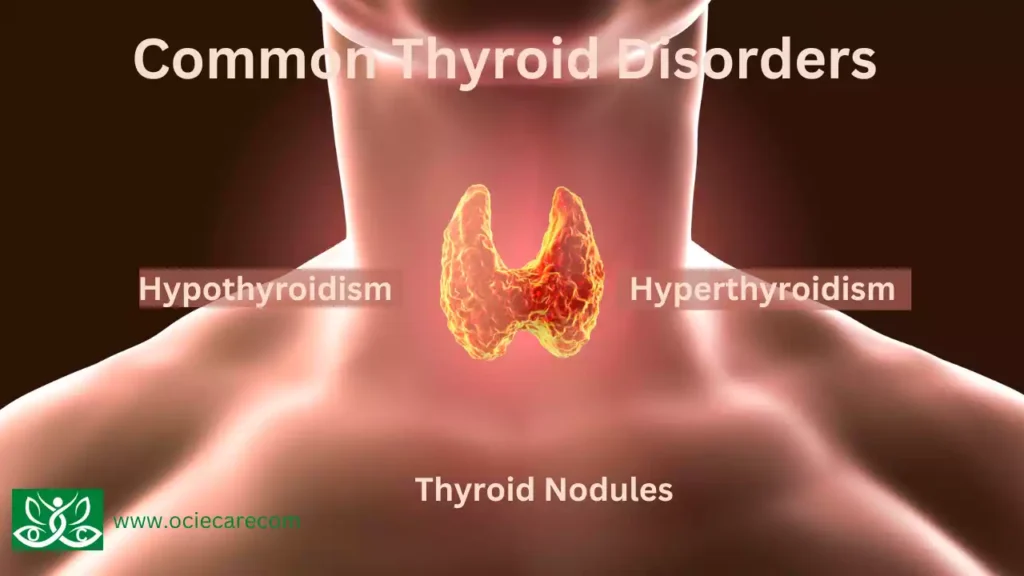
I. Hyperthyroidism
In the realm of thyroid disorders, hyperthyroidism emerges as a compelling condition where the thyroid gland relinquishes its usual equilibrium and embarks on a voyage of overactivity.
During this extraordinary journey, the gland goes into overdrive, relentlessly producing an excessive quantity of thyroid hormones, thus disrupting the delicate harmony of the body’s internal workings. Like an unpredictable maestro, hyperthyroidism conducts a symphony of symptoms that serve as a poignant reminder of its presence.
Effects on Body
- One of the key hallmarks of hyperthyroidism is unintended weight loss, where individuals witness the gradual shedding of pounds without intentional effort.
- As if an insatiable hunger overtakes them, they find their appetite heightened, leading to increased food consumption.
- Simultaneously, their hearts race like a thoroughbred on a sprint, as the rapid heartbeat becomes a constant companion.
- The mind, too, bears the brunt of this hormonal surge, with nerves on edge and a prevailing sense of irritability and restlessness that colors daily interactions.
The intricate dance of symptoms in hyperthyroidism paints a vivid picture of the body’s struggle to restore balance. It is a tale of excess, where the thyroid gland, usually a silent guardian, assumes the role of an unruly conductor. In this performance, the language of the body is disrupted, revealing the relentless power of overactive thyroid hormones.
So, hyperthyroidism stands as a testament to the profound impact of hormonal imbalances on our well-being. It teaches us the importance of equilibrium and reminds us of the intricate dance between our endocrine system and overall health. Through understanding and awareness, we strive to restore harmony, allowing our bodies to regain their natural state of balance and tranquility.
II. Hypothyroidism
In the realm of thyroid disorders, hypothyroidism takes center stage as a condition marked by the thyroid gland’s diminished activity, leading to a deficiency of thyroid hormones.
Like a symphony silenced, the body’s metabolic processes gradually descend into a slower rhythm, creating a cascade of effects that shape the landscape of this condition. Within this intricate landscape, symptoms of hypothyroidism manifest as poignant reminders of the body’s struggle to regain its equilibrium.
Effects on the Body:
- One of the key orchestrators of this symphony of symptoms is fatigue, an unwelcome companion that envelops individuals with a persistent sense of weariness, even after a full night’s rest.
- As if bound by invisible chains, they find themselves caught in the grip of unexplained weight gain, despite their best efforts.
- The cold, once a mere sensation, becomes an icy embrace as the body’s sensitivity to low temperatures intensifies.
- Amidst these physical manifestations, a shadow of melancholy can descend upon the spirit, as depression weaves its silent thread, leaving individuals feeling emotionally vulnerable.
- Furthermore, the cognitive landscape can bear the weight of impairment, as mental fog and difficulties with memory and concentration permeate daily life.
Within the realm of hypothyroidism lies a complex narrative, where the absence of thyroid hormones casts a profound shadow on the body’s vitality. It is a tale of slowed rhythms and muted vitality, where the thyroid gland’s diminished function holds sway over the body’s metabolic symphony.
In conclusion, hypothyroidism serves as a reminder of the intricate interplay between the thyroid gland and our overall well-being. Through its manifestation of symptoms, it unveils the importance of thyroid hormones in maintaining balance and vitality. By unraveling its story and seeking proper diagnosis and treatment, we endeavor to restore the body’s harmony, allowing the symphony of health to flourish once more.
III. Thyroid Nodules
Within the intricate tapestry of the thyroid gland, nodules emerge as enigmatic formations, giving rise to a sense of intrigue and concern. These abnormal growths or lumps take root within the gland itself, creating a landscape that requires careful examination.
While the majority of thyroid nodules are benign, a small fraction harbors the potential for malignancy, casting a shadow of uncertainty over their presence. In the face of these nodules, further testing and treatment become imperative.
Assessments:
- Thyroid nodules, like secret keepers, hide their true nature behind a veil of ambiguity. While the majority pose no threat to our well-being, their presence warrants attention and vigilance.
- The journey begins with a careful assessment, as medical professionals seek to unravel the secrets held within these nodules.
- Additional testing, such as ultrasound or fine-needle aspiration biopsy, may be employed to shed light on their composition and ascertain the risk they may carry.
- It is through this diligent pursuit of knowledge that the true nature of the nodules is unraveled, separating the benign from the potentially malignant.
Cancerous Thyroid Nodules:
For those found to be cancerous, a new chapter unfolds, characterized by swift action and personalized treatment.
- In the realm of cancerous thyroid nodules, the path forward may involve surgery to remove the affected tissue, accompanied by further interventions such as radioactive iodine therapy or targeted medication.
- The goal is to navigate the delicate terrain of cancer, armed with precision and compassion, offering patients the best chance at recovery and restored health.
In the realm of thyroid nodules, knowledge, and action form a symbiotic relationship. It is through understanding their presence, conducting thorough examinations, and pursuing the appropriate course of treatment that we can ensure the well-being of those affected.
By shining a light on the enigmatic nature of nodules, we empower individuals with the knowledge and resources needed to navigate this intricate landscape with confidence and resilience.
Therefore, thyroid nodules, though often benign, demand our attention and prompt action. Through careful examination, diagnosis, and treatment, we can unravel the mysteries they hold and provide individuals with the assurance they seek. By embracing the journey of understanding, we strive to transform the landscape of uncertainty into one of clarity and well-being.
Causes and Symptoms of Thyroid Disorders
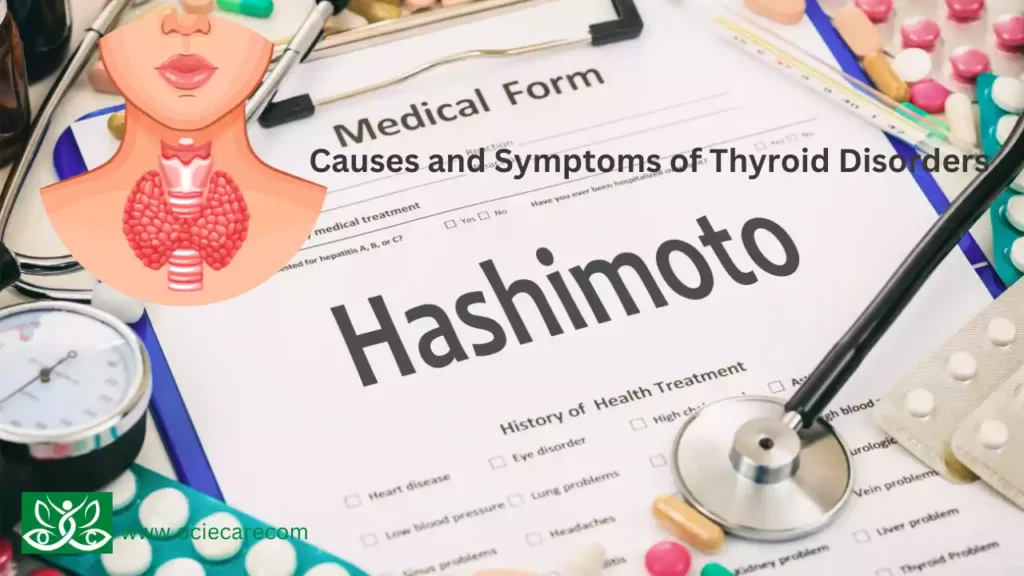
Thyroid disorders, with their multifaceted origins, offer a glimpse into the intricate interplay of factors that can disrupt the delicate balance of this vital gland. A variety of causes can contribute to the development of thyroid disorders, each with its unique role in shaping the landscape of dysfunction.
Causes:
- One of the primary causes of thyroid disorders is an autoimmune condition called Hashimoto’s thyroiditis.
- This occurs when the immune system mistakenly attacks the thyroid gland, leading to inflammation and impairing its ability to produce thyroid hormones adequately.
- Another common cause is Graves’ disease, an autoimmune disorder that stimulates the thyroid gland to produce excessive amounts of thyroid hormones.
- Additionally, certain genetic factors, environmental influences, and iodine deficiency can also contribute to the development of thyroid disorders.
- Certain medications and even radiation exposure can further contribute to the manifestation of thyroid dysfunction, weaving a complex tapestry of causation.
Symptoms:
Thyroid disorders present a wide range of symptoms, which can vary depending on the specific condition.
- Some common symptoms include fatigue, weight changes, mood swings, and difficulty concentrating.
- Individuals with an underactive thyroid, known as hypothyroidism, may experience weight gain, dry skin, constipation, and depression.
- On the other hand, individuals with an overactive thyroid, known as hyperthyroidism, may exhibit symptoms such as weight loss, rapid heartbeat, irritability, and tremors.
Furthermore, thyroid disorders can affect women more frequently than men, particularly during specific life stages such as pregnancy and menopause.
It is important to note that early detection and proper management of thyroid disorders are crucial for maintaining overall health and well-being. If you experience any persistent symptoms or suspect you may have a thyroid disorder, it is essential to consult with a healthcare professional for a comprehensive evaluation and appropriate treatment.
Diagnostic Tests for Thyroid Disorders
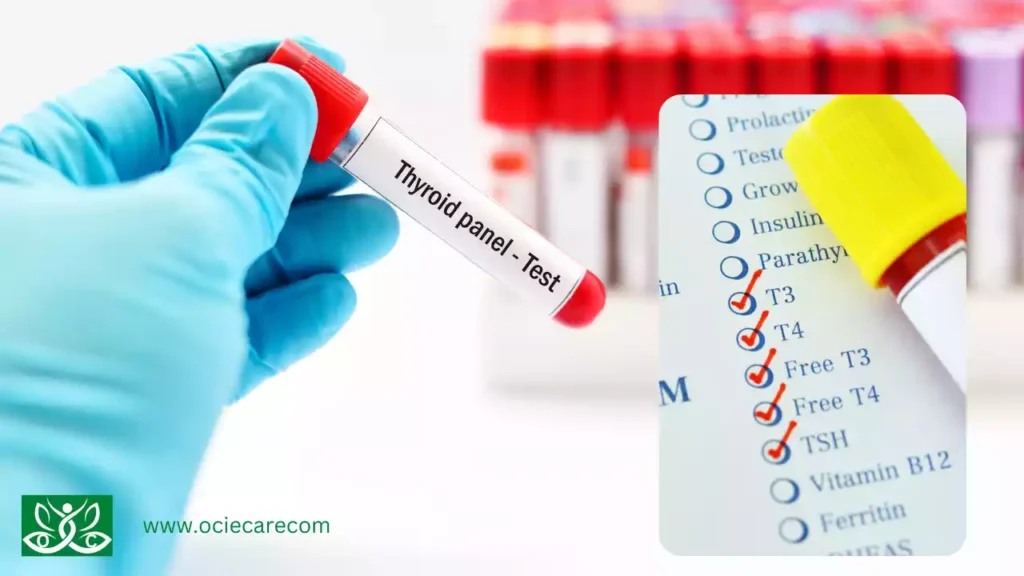
The journey toward an accurate diagnosis of thyroid disorders entails a meticulous array of tests and procedures. Healthcare professionals employ various methods to unravel the complexities of the thyroid gland, measure hormone levels, scrutinize its structure, and identify any abnormalities that may be present.
Here are Diagnostic Tests for Thyroid Disorders:
I. TSH (Thyroid-Stimulating Hormone) Test:
- This blood test measures the levels of TSH, which is produced by the pituitary gland to stimulate the thyroid gland. Abnormal TSH levels can indicate an underactive or overactive thyroid.
II. Thyroid Hormone Levels:
- Blood tests can measure the levels of thyroid hormones, including T3 (triiodothyronine) and T4 (thyroxine). Low levels may indicate hypothyroidism, while high levels may suggest hyperthyroidism.
III. Thyroid Antibody Tests:
These tests detect the presence of antibodies associated with autoimmune thyroid disorders, such as Hashimoto’s thyroiditis and Graves’ disease. Elevated antibody levels can help diagnose these conditions.
IV: Thyroid Ultrasound:
- This imaging test uses sound waves to create images of the thyroid gland. It helps evaluate the size, structure, and abnormalities of the gland, including the presence of nodules or tumors.
V. Radioactive Iodine Uptake (RAIU) Test:
- In this test, a small amount of radioactive iodine is administered orally, and its absorption by the thyroid gland is measured. It helps determine how well the thyroid gland is functioning.
VI. Fine-Needle Aspiration (FNA) Biopsy:
- This procedure involves using a thin needle to extract cells from thyroid nodules or suspicious areas. The cells are then examined under a microscope to check for cancer or other abnormalities.
VII. Thyroid Scan:
- During this test, a radioactive tracer is injected, which allows imaging of the thyroid gland. It helps evaluate the overall function and structure of the thyroid.
VIII. Thyroid Stimulating Immunoglobulin (TSI) Test:
- This blood test measures the levels of TSI, which is present in individuals with Graves’ disease. Elevated TSI levels indicate the presence of this autoimmune disorder.
IX. Thyrotropin-Releasing Hormone (TRH) Stimulation Test:
- This test involves injecting TRH to assess the response of the pituitary gland and thyroid gland. It helps differentiate between primary and secondary causes of thyroid disorders.
X. Genetic Testing:
- In some cases, genetic testing may be recommended to identify specific gene mutations associated with inherited thyroid disorders.
These diagnostic tests play a crucial role in evaluating thyroid function, identifying the type and severity of thyroid disorders, and guiding appropriate treatment strategies.
Thus, the diagnosis of thyroid disorders relies on a combination of tests and procedures that delve into the intricate workings of the thyroid gland.
By measuring hormone levels, examining the gland’s structure, and evaluating the presence of nodules or irregularities, healthcare professionals equip themselves with the tools necessary to provide accurate diagnoses and guide individuals toward optimal treatment and management strategies.
Conventional Treatment Options for Thyroid Disorders
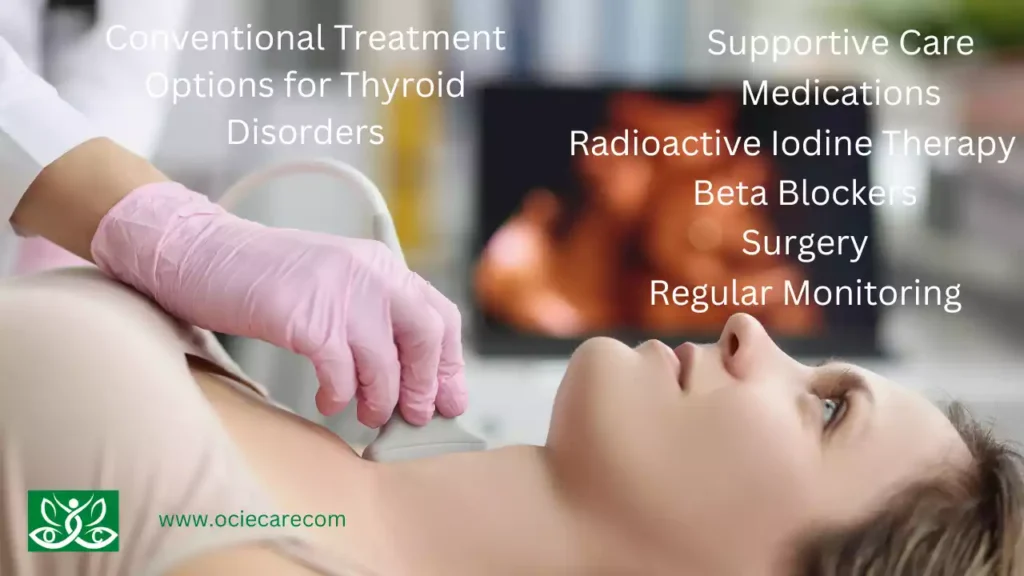
Conventional treatment approaches for thyroid disorders focus on restoring hormone balance and alleviating the associated symptoms. Healthcare professionals employ a range of options to address these conditions, including medications, radioactive iodine therapy, and, when necessary, thyroid surgery.
I. Medications:
a. Levothyroxine:
- This synthetic thyroid hormone is commonly prescribed for hypothyroidism. It helps replace the deficient thyroid hormone and restore normal hormone levels.
b. Methimazole and Propylthiouracil:
- These medications are used to treat hyperthyroidism by inhibiting the production of thyroid hormones. They help regulate hormone levels and alleviate symptoms.
II. Radioactive Iodine Therapy:
- This treatment involves swallowing a radioactive iodine pill, which is selectively absorbed by the thyroid gland. The radiation destroys the overactive thyroid cells, reducing hormone production. It is commonly used for hyperthyroidism.
III. Beta Blockers:
- These medications are often prescribed to manage the symptoms associated with hyperthyroidism, such as rapid heartbeat, tremors, and anxiety. Beta-blockers help control these symptoms by blocking the effects of excess thyroid hormones on the body.
IV. Surgery:
- In some cases, surgical intervention may be necessary. Thyroidectomy involves the removal of all or part of the thyroid gland. It is typically recommended for large nodules, thyroid cancer, or when other treatments have been unsuccessful.
V. Supportive Care:
- Alongside medical interventions, certain lifestyle modifications can help manage thyroid disorders. These may include stress reduction techniques, regular exercise, a balanced diet, and ensuring adequate iodine intake.
VI. Regular Monitoring:
- It is essential for individuals with thyroid disorders to undergo regular check-ups and monitoring. This allows healthcare professionals to assess hormone levels, adjust medication dosages if needed, and ensure optimal thyroid function.
It’s important to note that treatment options may vary depending on the specific type and severity of the thyroid disorder, as well as individual factors.
Healthcare professionals will determine the most appropriate treatment plan based on comprehensive evaluation and consideration of the patient’s overall health. Individuals must work closely with their healthcare team and follow their guidance for effective management of thyroid disorders.
Natural Solutions for Thyroid Health
In addition to conventional treatments, incorporating natural solutions into thyroid care can offer valuable support for overall well-being. These complementary approaches encompass dietary and nutritional modifications, herbal supplements, stress reduction techniques, and regular exercise, all of which contribute to maintaining optimal thyroid health.
I. Balanced Diet:
- A nutrient-rich diet plays a vital role in supporting thyroid health. Include foods rich in iodine, such as seaweed, iodized salt, and seafood.
- Additionally, ensure an adequate intake of selenium from sources like Brazil nuts, eggs, and legumes. Consuming fruits, vegetables, and whole grains provides essential vitamins and minerals for overall health.
Learn How Vegan Diet Helps to Improve Magically On Body, Mind, Digestion & Weight
II. Stress Management:
- Chronic stress can negatively impact thyroid function. Engage in stress-reducing activities like yoga, meditation, deep breathing exercises, or hobbies that help you relax.
- Prioritizing self-care and finding healthy outlets for stress can support thyroid health.
Learn The Transformative Power of Yoga for Mind, Body, and Soul At Home
III. Regular Exercise:
- Engaging in regular physical activity can benefit thyroid function.
- Exercise helps boost metabolism, improve energy levels, and promote overall well-being.
- Aim for a combination of cardiovascular exercises, strength training, and flexibility exercises for optimal results.
IV. Herbal Supplements:
- Certain herbs are believed to support thyroid health. Examples include ashwagandha, bladderwrack, and guggul.
- However, it’s essential to consult with a healthcare professional before starting any herbal supplements to ensure they are safe and appropriate for your specific condition.
Know More About A Natural Amazing Solution Ashwagandha for Improved Well-Being
V. Avoid Environmental Toxins:
- Environmental toxins like heavy metals and endocrine-disrupting chemicals can affect thyroid function.
- Minimize exposure to toxins by using natural cleaning and personal care products, drinking filtered water, and being mindful of your environment.
VI. Adequate Sleep:
- Quality sleep is crucial for overall health, including thyroid function.
- Establish a regular sleep routine, create a relaxing sleep environment, and prioritize getting enough restful sleep each night.
Know How to Get Deep Sleep Naturally For 08 Hours
VII. Limit Processed Foods and Sugar:
- Processed foods and excessive sugar intake can negatively impact thyroid health.
- Opt for whole, unprocessed foods and reduce your consumption of sugary snacks, desserts, and beverages.
VIII. Regular Thyroid Self-Exams:
- Become familiar with the normal size and shape of your thyroid gland, and perform regular self-exams to detect any noticeable changes or abnormalities.
- If you notice any concerning changes, consult with a healthcare professional for further evaluation.
IX. Consultation with a Healthcare Professional:
- While natural solutions can support thyroid health, it’s essential to work with a healthcare professional for proper diagnosis, monitoring, and guidance.
- They can provide personalized recommendations based on your specific needs and help integrate natural solutions into your overall treatment plan.
Remember, natural solutions can complement conventional medical treatments but should not replace them. It’s important to have open communication with your healthcare provider to ensure a comprehensive and well-rounded approach to thyroid health.
Thyroid Treatment: Finding the Right Approach
When it comes to the treatment of thyroid disorders, a personalized and collaborative approach is key. The field of integrative medicine offers a comprehensive framework that combines conventional and alternative therapies, considering the individual as a whole and aiming to optimize thyroid care.
I. Comprehensive Evaluation:
- The first step in thyroid treatment is a comprehensive evaluation by a healthcare professional.
- They will assess your symptoms, conduct physical examinations, and order appropriate tests to determine the type and severity of the thyroid disorder.
II. Medication Options:
- Depending on the diagnosis, medication may be prescribed.
- Synthetic thyroid hormones like levothyroxine are commonly used for hypothyroidism, while medications like methimazole or propylthiouracil may be prescribed for hyperthyroidism.
- Finding the right medication and dosage is crucial for maintaining optimal thyroid function.
III. Regular Monitoring:
- Regular monitoring of thyroid hormone levels is essential to ensure the effectiveness of treatment.
- Blood tests, including TSH, T3, and T4 levels, help healthcare professionals make necessary adjustments to medication dosages.
IV. Lifestyle Modifications:
- Adopting a healthy lifestyle can support thyroid health.
- This includes maintaining a balanced diet, managing stress, getting regular exercise, and ensuring adequate sleep.
- These lifestyle modifications can complement medical treatments and promote overall well-being.
V. Surgical Intervention:
- In some cases, surgery may be necessary.
- Thyroidectomy, the surgical removal of all or part of the thyroid gland, may be recommended for conditions such as thyroid cancer, large nodules, or when other treatments have been ineffective.
VI. Radioactive Iodine Therapy:
- Radioactive iodine therapy is a non-surgical option primarily used for hyperthyroidism.
- It involves taking a radioactive iodine pill that selectively destroys overactive thyroid cells, reducing hormone production.
VII. Alternative and Complementary Therapies:
- Some individuals explore alternative or complementary therapies, such as acupuncture, herbal remedies, or dietary supplements.
- It’s important to consult with a healthcare professional before incorporating these treatments to ensure their safety and efficacy.
VIII. Patient Education and Support:
- Understanding your thyroid disorder and its treatment options is essential.
- Educate yourself about the condition, ask questions, and seek support from healthcare professionals, support groups, or online communities.
- Empower yourself with the knowledge to make informed decisions about your treatment.
IX. Individualized Approach:
- Each person’s thyroid disorder is unique, so treatment should be tailored to their specific needs.
- Working closely with a healthcare professional allows for personalized treatment plans that consider factors such as age, overall health, and preferences.
X. Open Communication:
- Effective communication with your healthcare provider is vital. Discuss your symptoms, concerns, and treatment preferences openly.
- Together, you can find the right approach to manage your thyroid disorder and optimize your overall well-being.
Remember, finding the right approach may involve a combination of treatments and adjustments over time. Continual monitoring and collaboration with your healthcare team will ensure the best possible outcomes for your thyroid health.
The Thyroid Factor: A 21-Day System for Women
Are you constantly feeling tired and lacking energy?
Does getting started in the morning seem like an impossible task?
Even after a good night’s sleep, do you still feel exhausted?
If so, keep reading because these three thyroid tips will reveal what you should avoid to combat fatigue and boost your energy levels.
Thyroid Tip 1: Beware of Certain Canned Fruits and Veggies
- Believe it or not, some canned fruits and vegetables can work against your body’s energy levels.
- While you may think you’re making healthy choices, these foods may be draining your energy without you even realizing it.
- Many canned fruits and veggies contain added sugars and syrups that are not as healthy as they seem.
- It’s important to be aware of these hidden ingredients to ensure you’re making the right choices for your health.
Example:
- Let’s say you enjoy canned fruits with your breakfast, thinking they’re a healthy option.
- However, those fruits may contain high amounts of added sugars and syrups, which can lead to energy crashes and hinder weight loss efforts.
- Remember, relying solely on organic foods is not always the solution either, as they can be expensive and may not offer the benefits they claim to have.
Thyroid Tip 2: Reconsider Your Breakfast Choices
- Many so-called “healthy” breakfast options may not be as beneficial for your energy levels as you think.
- Foods like “heart-healthy” whole grains, tropical fruits, and bran-based cereals can be packed with processed carbs and high levels of sugar.
- Starting your day with these foods might not provide the energy boost you desire.
- It’s a common misconception that adopting a healthier lifestyle means eliminating flavorful foods you enjoy.
- However, that’s not necessarily the case. You can still enjoy a balanced diet while promoting your overall health.
- Making a simple one-minute shift in your morning routine can make a significant difference.
- Consider adding a unique and unexpected ingredient to your breakfast to enhance your energy levels and well-being.
Example:
- Imagine waking up each morning bursting with energy, without experiencing the dreaded 2 p.m. energy crashes.
- By incorporating this simple shift into your breakfast routine, you can experience a noticeable improvement in your energy levels and surprise your friends and colleagues with your renewed vitality.
Thyroid Tip 3: Embrace Variety in Your Workouts
- Repetitive and monotonous workouts can become boring and demotivating.
- If you feel like you’re going through the motions and trapped in a body that doesn’t reflect your true vitality, it’s time to shake things up.
- Engaging in a variety of workouts can help you feel better throughout the day and support your overall well-being.
- It’s important to understand that there is no one-size-fits-all approach to improving your health.
- Finding a simpler and easier way to enhance your well-being without wasting hours on ineffective methods is key.
- And the best part is, you can start implementing this technique tonight before bed.
You deserve a solution that supports female health and is easy to incorporate into your busy lifestyle. It should be an approach that is easy to implement, helps fight fatigue and aches, boosts energy levels naturally, and ultimately increases your self-confidence.
Introducing The Thyroid Factor: A 21-Day System for Women
The Thyroid Factor is a 21-day system designed specifically for women, focusing on targeted nutrition techniques and eating strategies to support a more balanced body. Within this step-by-step eating plan, you’ll discover which foods support female thyroid activity, which foods can trigger fatigue, and a simple and enjoyable 21-day eating plan.
Listen, I understand that it might be difficult for you to imagine living a high-energy lifestyle again, but you’re not alone. Countless women who were once in your shoes have found renewed energy and vitality through The Thyroid Factor. It’s time to become a believer and take control of your health.
Remember, fighting fatigue and boosting your energy levels doesn’t have to be complicated or overwhelming. With the right approach and guidance, you can reclaim your vitality and live a more energetic and fulfilling life.
Conclusion
In conclusion, our articles on thyroid health and treatment options offer valuable insights for individuals seeking a deeper understanding of thyroid disorders and ways to improve their well-being. By exploring the intricacies of the thyroid gland, including its anatomy, function, and common disorders such as hyperthyroidism, hypothyroidism, and thyroid nodules, readers can gain a comprehensive understanding of these conditions.
We have also highlighted the causes and symptoms of thyroid disorders, along with various diagnostic tests and conventional treatment options available. Additionally, our articles emphasize the importance of incorporating natural solutions, such as diet and nutrition, herbal supplements, stress reduction techniques, and exercise, to support thyroid health.
With these comprehensive resources at hand, readers can make informed decisions and take proactive steps toward optimizing their thyroid function and overall vitality.
FAQs
Q. Can thyroid disorders be cured naturally?
A. While thyroid disorders cannot be cured entirely through natural means, natural solutions can play a significant role in managing symptoms and supporting overall thyroid health. These natural approaches can complement conventional treatments and contribute to an improved quality of life.
Q. Are there any dietary restrictions for thyroid patients?
A. Individuals with thyroid disorders may benefit from avoiding goitrogenic foods like soy, cabbage, and kale. However, it’s important to note that dietary recommendations may vary based on individual circumstances. Consulting with a healthcare professional or registered dietitian can help create a personalized dietary plan that considers specific needs and goals.
Q. How long does it take for thyroid medication to show results?
A. The time it takes for thyroid medication to show results can vary from person to person. Factors such as the specific medication, dosage, and individual response contribute to the timeline. Regular monitoring and communication with a healthcare professional are essential to ensure the medication is effective and adjustments can be made if necessary.
Q. Can stress affect thyroid function?
A. Yes, chronic stress can impact thyroid function. High-stress levels can disrupt the delicate balance of hormone production in the thyroid gland. Stress reduction techniques such as meditation, deep breathing exercises, and engaging in activities that promote relaxation can help manage stress levels and support thyroid health.
Q. Are there any alternative therapies for thyroid disorders?
A. Alternative therapies, including acupuncture, chiropractic care, and homeopathy, may offer additional support for individuals with thyroid disorders. Integrative medicine approaches that combine conventional and alternative therapies can provide a comprehensive and personalized treatment plan. Consulting with a healthcare professional experienced in integrative medicine can help explore these alternative options and determine their suitability.



Your article helped me a lot, is there any more related content? Thanks!